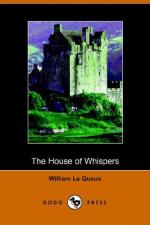The argument was apparently convincing. The Baron’s secretary smoked on in thoughtful silence, his eyes fixed upon the wall in front of him.
“Well,” he said at last, “if you promise to view the matter in all seriousness, I’ll tell you. Briefly, it’s this. Of course, you’ve never been to Semlin—or Zimony, as they call it in the Magyar tongue. To understand aright, I must describe the place. In the extreme south of Hungary, where the river Save joins the Danube, the town of Semlin guards the frontier. Upon a steep hill, five kilometres from the town, stands the Baron’s residence, a long, rather inartistic white building, which, however, is very luxuriously furnished. Comparatively modern, it stands near the ruins of a great old castle of Hetzendorf, which commands a wide sweep of the Danube. Now, amid those ruins strange noises are sometimes heard, and it is said that upon all who hear them falls some terrible calamity. I’m not superstitious, but I’ve heard them—on three occasions! And somehow—well, somehow—I cannot get rid of an uncanny feeling that some catastrophe is to befall me! I can’t go back to Semlin. I’m unnerved, and dare not return there.”
“Noises!” cried Walter Murie. “What are they like?” he asked quickly, starting from his chair, and staring at his friend.
“They seem to emanate from nowhere, and are like deep but distant whispers. So plain they were that I could have sworn that some one was speaking, and in English, too!”
“Does the baron know?”
“Yes, I told him, and he appeared greatly alarmed. Indeed, he gave me leave of absence to come home to England.”
“Well,” exclaimed Murie, “what you tell me, old chap, is most extraordinary! Why, there is almost an exactly similar legend connected with Glencardine!”
“Glencardine!” cried his friend. “Glencardine Castle, in Scotland! I’ve heard of that. Do you know the place?”
“The estate marches with my father’s, therefore I know it well. How extraordinary that there should be almost exactly the same legend concerning a Hungarian castle!”
“Who is the owner of Glencardine?”
“Sir Henry Heyburn, a friend of mine.”
“Heyburn!” echoed Hamilton. “Heyburn the blind man?” he gasped, grasping the arm of his chair and staring back at his companion. “And he is your friend? You know his daughter, then?”
“Yes, I know Gabrielle,” was Walter’s reply, as there flashed across him the recollection of that passionate letter to which he had not replied. “Why?”
“Is she also your friend?”
“She certainly is.”
Hamilton was silent. He saw that he was treading dangerous ground. The legend of Glencardine was the same as that of the old Magyar stronghold of Hetzendorf. Gabrielle Heyburn was Murie’s friend. Therefore he resolved to say no more.
Gabrielle Heyburn!




